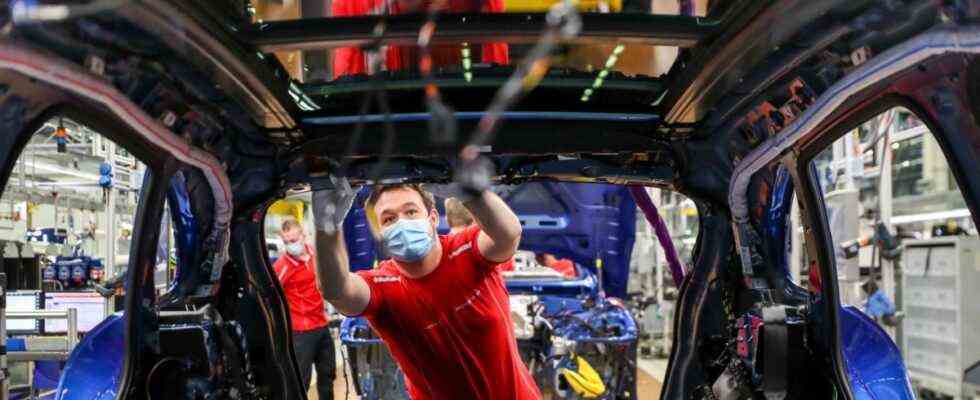Germany finds out from the Corona crisis. In July, fewer citizens were looking for work than in the previous month. “The growth in employment continues. And companies are increasingly looking for new staff,” said the chairman of the Federal Employment Agency (BA), Detlef Scheele. There are concerns about a fourth corona wave – and about possible permanent damage from the pandemic.
So far, however, the positive trend has continued. The number of unemployed shrank in July by 24,000 to just under 2.6 million. And this although the number of job seekers increases during the holiday season because some jobs run out during this time and companies make few new offers. “Despite the beginning of the summer break, unemployment has continued to fall sharply,” emphasizes agency boss Scheele.
“At the moment the labor market is recovering strongly from the pandemic,” analyzes Enzo Weber from the Institute for Employment Research (IAB). There are mutliple reasons for this. The world economy has been picking up for a long time. US President Joe Biden is stimulating the economy through huge spending programs. German exports are increasing. The industry is hiring more people again, registered the Munich Ifo Institute. Chemical companies, for example, are increasingly looking for employees. In some companies there is a shortage of skilled workers again – just like before the crisis.
A possible fourth wave threatens growth
It has a positive effect that restaurants and shops that have been closed for a long time are allowed to open. The trade, which has been badly hit for months, is hiring staff again. Overall, most sectors in Germany already have more employees with social security insurance than before the pandemic – a great success.
There are two risks. Many companies are missing chips and other parts. The car manufacturer Daimler is therefore sending thousands of employees on short-time work. However, many economists consider these problems to be temporary. A fourth corona wave from the very contagious Delta variant could become a bigger problem. Leading indicators for the economy such as the Ifo index are already falling.
There are still many unanswered questions. Do so many restaurants and shops have to be closed with a new corona wave if, unlike in the previous waves, many Germans are vaccinated? “The risks are on the rise,” sums up IAB researcher Enzo Weber. But he is optimistic that there will still be no dramatic effects on jobs.
Overall, corona damage will remain. In 2019, the year before the pandemic, the number of employees rose by around 40,000 every month. The virus has prevented this increase since the spring of last year – and also destroyed jobs. Half a million citizens had fewer jobs in June than before the pandemic.
In addition, the corona crisis fueled structural change. Germans buy more online and less in department stores. Video conferences replace business trips with flights and overnight stays in a hotel. Hundreds of thousands of jobs are permanently lost. Yes, the change also brings new jobs, in information technology, in the pharmaceutical and health sectors. The bottom line, however, is that economist Weber calculates a permanent corona minus of 200,000 jobs.
On average, wages are only increasing 1.6 percent
Employees are feeling another effect of the crisis in their wallets: their salaries are not developing as well as in previous years. According to the Institute for Economic and Social Sciences (WSI), the wages previously agreed in a collective agreement will only increase by an average of 1.6 percent this year. For comparison: in 2018 and 2019 the plus was almost twice as high. The decline is easy to explain: In view of the severe recession, the trade unions have recently hardly insisted on significant wage increases in order not to provoke layoffs. IG Metall was satisfied with a one-off bonus for the four million employees in the industry. A permanent wage increase was only agreed for next year.
The fact that consumer prices are increasing more strongly this year than they have for a long time is having a negative impact on employees. Therefore, the bottom line is that collectively agreed wages are even shrinking. Although the minus 0.2 percent is not great. But it is a turning point for employees: real wages are falling for the first time in ten years. This has only happened three times in the past two decades.
What’s next on the job market? The analysis shows that after a crisis a lot of new hires are needed so that the unemployment base does not increase permanently. This only succeeded once after the severe recessions in the Federal Republic: after the financial crisis of 2008/2009. This time, however, the country is not only experiencing a recession, it is also experiencing a shift towards digitization and less climate-damaging cars and steel products. There are several hundred thousand more long-term unemployed than before the crisis.
IAB economist Weber calls on the next federal government to take countermeasures in order to keep long-term damage as low as possible. For example with more wage subsidies to companies that hire staff. And with the financing of secondary training for employees who change jobs – for example because their car company no longer produces combustion engines.

